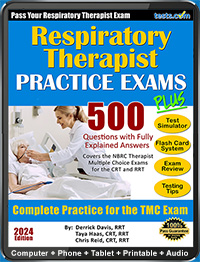Respitory TherapistTest Guide
| The CRT Test Summary
|
|
|---|---|
| What: The CRT is a certification exam for respiratory therapy. | |
| Who: Entry-level respiratory therapists can take this certification test. | |
| Where: The exam is given at 170 test centers nationwide. | |
| When: The test is offered year-round; test candidates can make individual appointments to test. | |
| How: The exam is administered over a computer. | |
| Type: CRT exams are multiple-choice. | |
| Why: Professional certification demonstrates knowledge and competency in the field. | |
| Time: Three hours | |
| Language: English | |
| Preparation: Test candidates should review practice exams and study guides in preparation for the exam. | |
| Cost: $190 | |
By: Erin Hasinger, Tests.com
The Certified Respiratory Therapist Exam (CRT) is an exam for entry-level respiratory therapists. Successful performance on the exam leads to the CRT designation, which is a voluntary certification credential. Certification can be used by respiratory therapists to demonstrate to current and future employers their dedication to their career as well as a high level of competency in respiratory therapy. The certification is administered by the National Board for Respiratory Care.
The CRT test is comprised of 160 multiple-choice questions that cover clinical data, therapeutic procedures and equipment. Twenty questions are pretest questions. Test questions will focus on the ability of the test taker to recall, apply and analyze information. Three hours are allotted for completion of the exam.
CRT exam sections include:
- Patient data evaluation and recommendations (26 questions)
o Review patient record data
o Collect and evaluate clinical information
o Recommend procedures for collecting additional data
- Equipment manipulation, infection control and quality control (29 questions)
o Manipulate equipment by protocol or order
o Ensure infection control
o Perform quality control procedures
- Initiation and modification of therapeutic procedures (85 questions)
o Achieve adequate respiratory support
o Assist physicians in special procedures
o Conduct pulmonary rehabilitation and home care
o Determine appropriateness of respiratory care plans
o Evaluate and monitor patient objectives and responses to care
o Independently modify therapeutic procedures
o Initiate, conduct and modify emergency respiratory care techniques
o Maintain patient airway and care for artificial airways
o Maintain records and communicate information
o Recommend modifications in respiratory care plan
o Remove bronchopulmonary secretions
Exam candidates must be 18 years old and either have an associate degree in respiratory therapy from an accredited institution or be enrolled in an accredited bachelor’s degree program in respiratory therapy. Candidates meeting the latter requirement will need to provide a certificate of completion from their college or university that indicates the successful completion of coursework in advanced science and respiratory therapy classes.
Test candidates can register for the exam online at www.nbrc.org. The exam fee of $190 must be paid during registration. Approximately two weeks after submission of the application to test, test candidates will receive an authorization letter that includes details on how to schedule an exam.
CRT exams are offered via computer at PSI Testing Centers. More than 170 test centers nationwide offer the CRT exam. Test appointments can be scheduled Monday through Saturday from 9:00 a.m. to 1:30 p.m. An appointment to test is required before a candidate will be able to take the exam.
Following completion of the exam, test takers will receive a score report from the proctor. The report will include a scaled score and indicate if the test taker passed or failed the exam. The minimum passing score on the CRT is 75. Within a month following the exam, candidates who passed the exam will receive a certificate and wallet card and may begin using the CRT designation with their name.
The National Board for Respiratory Care recommends that CRT test candidates become familiar with the computerized test model and suggests taking pretests to prepare. To find pretests and other CRT test preparation materials, please visit the CRT Test Directory.




